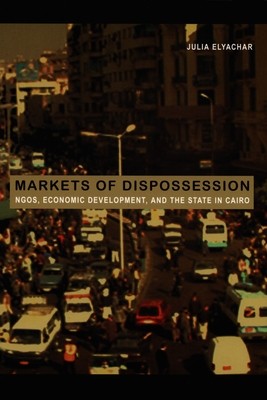
- We will send in 10–14 business days.
- Author: Julia Elyachar
- Publisher: Duke University Press
- ISBN-10: 0822335719
- ISBN-13: 9780822335719
- Format: 15.3 x 23.4 x 2 cm, softcover
- Language: English
- SAVE -10% with code: EXTRA
Reviews
Description
What happens when the market tries to help the poor? In many parts of the world today, neoliberal development programs are offering ordinary people the tools of free enterprise as the means to well-being and empowerment. Schemes to transform the poor into small-scale entrepreneurs promise them the benefits of the market and access to the rewards of globalization. Markets of Dispossession is a theoretically sophisticated and sobering account of the consequences of these initiatives.
Julia Elyachar studied the efforts of bankers, social scientists, ngo members, development workers, and state officials to turn the craftsmen and unemployed youth of Cairo into the vanguard of a new market society based on microenterprise. She considers these efforts in relation to the alternative notions of economic success held by craftsmen in Cairo, in which short-term financial profit is not always highly valued. Through her careful ethnography of workshop life, Elyachar explains how the traditional market practices of craftsmen are among the most vibrant modes of market life in Egypt. Long condemned as backward, these existing market practices have been seized on by social scientists and development institutions as the raw materials for experiments in "free market" expansion. Elyachar argues that the new economic value accorded to the cultural resources and social networks of the poor has fueled a broader process leading to their economic, social, and cultural dispossession.
EXTRA 10 % discount with code: EXTRA
The promotion ends in 17d.13:22:27
The discount code is valid when purchasing from 10 €. Discounts do not stack.
- Author: Julia Elyachar
- Publisher: Duke University Press
- ISBN-10: 0822335719
- ISBN-13: 9780822335719
- Format: 15.3 x 23.4 x 2 cm, softcover
- Language: English English
What happens when the market tries to help the poor? In many parts of the world today, neoliberal development programs are offering ordinary people the tools of free enterprise as the means to well-being and empowerment. Schemes to transform the poor into small-scale entrepreneurs promise them the benefits of the market and access to the rewards of globalization. Markets of Dispossession is a theoretically sophisticated and sobering account of the consequences of these initiatives.
Julia Elyachar studied the efforts of bankers, social scientists, ngo members, development workers, and state officials to turn the craftsmen and unemployed youth of Cairo into the vanguard of a new market society based on microenterprise. She considers these efforts in relation to the alternative notions of economic success held by craftsmen in Cairo, in which short-term financial profit is not always highly valued. Through her careful ethnography of workshop life, Elyachar explains how the traditional market practices of craftsmen are among the most vibrant modes of market life in Egypt. Long condemned as backward, these existing market practices have been seized on by social scientists and development institutions as the raw materials for experiments in "free market" expansion. Elyachar argues that the new economic value accorded to the cultural resources and social networks of the poor has fueled a broader process leading to their economic, social, and cultural dispossession.


Reviews